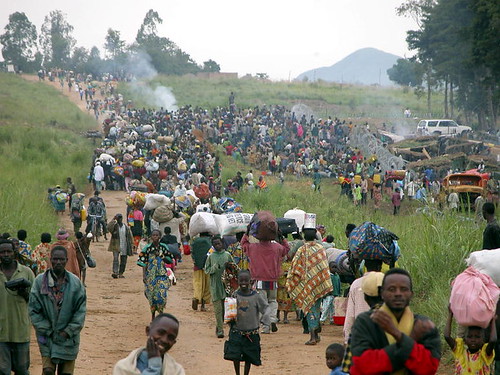 The ongoing conflict in the Democratic Republic of Congo has claimed over 5 million lives since 1998, making it the deadliest conflict worldwide since World War 2. On the 50th anniversary of the DRC’s independence, Avery Hancock explores how British companies, and thereby consumers, may be fuelling the conflict, and what the UK government is (or is not) doing about it.
The ongoing conflict in the Democratic Republic of Congo has claimed over 5 million lives since 1998, making it the deadliest conflict worldwide since World War 2. On the 50th anniversary of the DRC’s independence, Avery Hancock explores how British companies, and thereby consumers, may be fuelling the conflict, and what the UK government is (or is not) doing about it.
War in the Democratic Republic of Congo rarely makes headline news in the UK, so it is understandable that much of the public’s perception of the country is based on literary accounts – notably John Le Carré’s ‘The Mission Song’ and Tim Butcher’s Blood River. Le Carré especially paints a picture of a conflict that is almost unstoppable, in which companies and intelligence services jockey for position from London and the country houses of south-east England. But is there more to this picture than just a novelist’s imagination?

Certainly the conflict’s incredibly complex history defies simple explanations. Since 1994 when the Rwandan genocide spilled into its neighbouring eastern Provinces, ‘Africa’s Great War’ has involved eight African countries, over 25 armed groups, and the largest UN peacekeeping operation in history. But perhaps it is the temptation to dismiss the DRC as yet another faraway, ethnically-fueled conflict somewhere in the ‘dark heart of Africa,’ that keeps the stories about it off the front pages.
The fighting certainly does draw on long-standing political, tribal and ethnic grievances and disputes over land. But a recent report by London-based Global Witness suggests that there are baser motivations behind the conflict, namely the desire to control eastern DRC’s rich mineral deposits. These reserves have acted as a ‘magnet’ for rebel groups and military factions throughout the last decade. The minerals in question are gold and the ‘3T’s’ (tin, tungsten and tantalum) – which are found in everything on British high streets from mobile phones, laptop computers, and iPods to lightbulbs and electronic solders. These minerals are also traded every day on the London Metals Exchange.
The mining sector in the east DRC is largely unregulated – both cause and consequence of the breakdown of law and order and the devastation caused by the war. All armed groups in the east (including the Congolese army) have carved up access to mines through forced labour, violence and extortion. They have been able to establish lucrative trade networks through neighboring Rwanda, Burundi, and Uganda that transport the goods to the international market, where their DRC origin is long forgotten. The illicit trade consolidates the economic base of the armed groups, fuelling future conflict and denying revenues to the state. So while the war officially ended with a power-sharing agreement between President Joseph Kabila and various rebel groups in 2003, in 2008 there continued to be 45,000 conflict-related deaths each month, mostly from preventable diseases incubated by mass displacement and the absence of a functioning health system.
The resources dimensions of the conflict, with devastating impacts on civilians, are not news for the international community. In 2001 a UN Panel of Experts issued a report on the illegal exploitation of natural resources in the DRC, which found that rebels groups admitted to raising illegal taxes from mining to ‘finance or support the war effort.’ Two British companies, Afrimex and Ventro Star, appeared on the list of companies who allegedly ‘unlawfully or irregularly’ imported Congolese minerals via Rwanda. The UK Parliament report notes that Afrimex was cited again in 2008 and 2009 by UN Expert reports as having funded illegal armed groups through the purchasing of minerals supplied by traders reported to be financing the FDLR, a Rwandan-backed militia responsible for mass murder, rape, and other human rights abuses and war crimes. The BBC also reports that UK-based broker Amalgamated Metal Corporation PLC (AMC), whose Bangkok-based subsidiary Thaisarco is the world’s fifth largest producer of tin, has also recently come under fire for allegedly not verifying the source of its Congolese minerals.
In Parliament, the Afrimex case has recently been taken up by the Joint Committee on Human Rights who expressed concern at Afrimex’s record. However, they fell short of recommending that the company be put forward to the United Nations Sanctions Committee for violating Security Council Resolution 1857, which prohibits ‘individuals or entities supporting the illegal armed groups in the eastern part of the Democratic Republic of the Congo through illicit trade of natural resources.’ Instead the Committee recommended strengthening of the voluntary ‘due diligence’ mechanisms for ensuring industry transparency, such as the OECD guidelines on multinational enterprises that ‘require’ multinationals to ‘….respect the human rights of those affected by their activities consistent with the host government’s international obligations and commitments.’
The OECD guidelines are meant to be upheld by a UK National Contact Point (NCP), whose role is to promote the guidelines among British businesses and report any breaches to the Government. (Perhaps unsprisingly, Afrimex Director Ketan Kotecha claims to have had not heard of the guidelines). But the report admits the even though the UK NCP found that Afrimex had failed to respect human rights, the government refused to take action or make a statement. Global Witness characterizes the UK government’s overall response as weak and inadequate and has called for legislation that criminalises UK companies for their involvement in abuses committed abroad around conflict minerals.
In the USA there has been a move toward legislation with the introduction of the Conflict Minerals Trade Act of 2009 in House of Representatives. It would require companies which process and import minerals in the US to declare whether their products are conflict-free or not. The system of audits and regulation would be tougher than the voluntary Kimberly Process designed to combat the trade of conflict or ‘blood’ diamonds. The proposed legislation has already provoked reaction from electronics giant Intel. Campaign groups supporting the bill are quick to point out they do not advocate a boycott of Congolese minerals – because the country badly needs investment and development. But they argue that shining a light on the supply chain could help regulate the trade.
Developments in Washington will be of great interest to DRC champions in the UK Parliament like Lord Chidgery and the All Parliamentary Group on the Great Lakes Region of Africa. They will also matter to civil servants in the Department for International Development (DfID), the Foreign Office and related agencies. The UK is the largest bilateral donor in the Democratic Republic of Congo, contributing over £130 million pounds in 2009-2010 on much-needed health, education, and humanitarian assistance. Last year the UK also spent over an additional £62 million on contributions to the MONUC peacekeeping force. (However, the Guardian has also reported allegations that MONUC supports the same Congolese army and war criminals responsible for much of the mining chaos). Thus the UK is paying a large price for a conflict that doesn’t show signs of disappearing anytime soon.
Last year Andrew Mitchell, now Secretary of State at DFID, acknowledged the role of minerals in the conflict. He urged the then Labour government to help tackle the ‘root causes’ of the conflict. In a time of budget austerity, there is even more reason to examine the underlying causes of conflict and instability worldwide and do whatever is possible to remove incentives in UK law and regulations that help prolong the conflict there.
In London The Congo Now! campaign is taking over the South Bank centre on July 9th with free gigs & exclusive performances to raise awareness of the persistent conflict in the eastern region of Congo.





